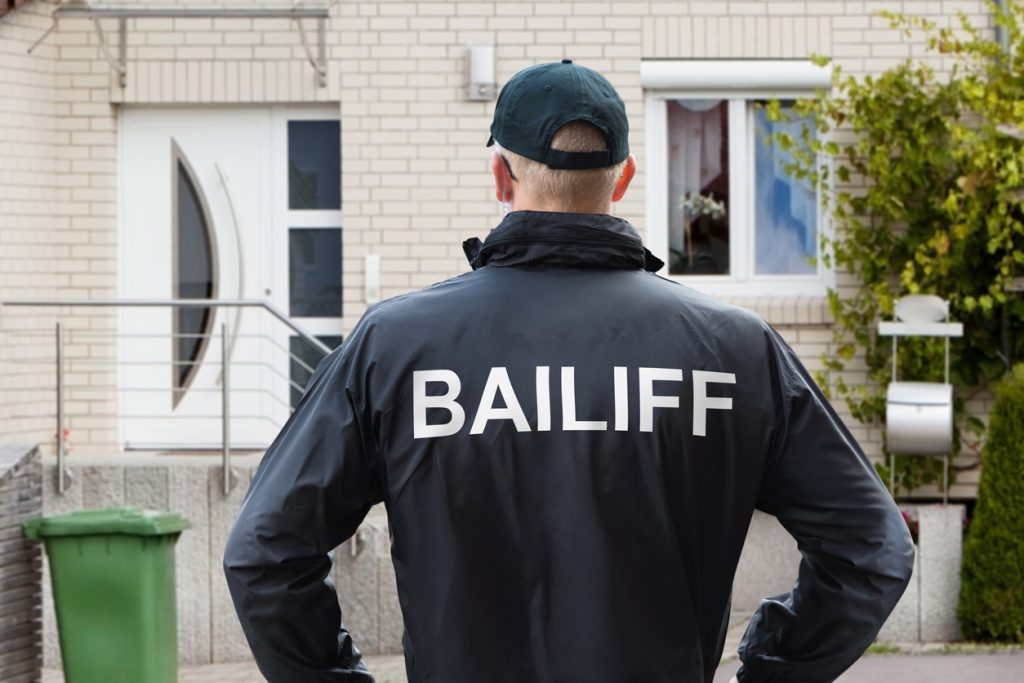Bailiffs have specific legal rights and powers when carrying out their duties. They can enter your property, seize goods, and sell them to recover debts. These powers are strictly regulated by law to protect both debtors and creditors.
Understanding bailiffs' legal rights is crucial if you're facing debt collection. They can typically enter through unlocked doors or windows, but cannot force entry unless collecting criminal fines or taxes. Bailiffs must provide proper identification and documentation before taking any action.
You have rights too when dealing with bailiffs. They cannot seize certain essential items like bedding or tools needed for work. It's important to know your rights and seek advice if you're unsure. Find out more about bailiffs here.
Legal Framework Governing Bailiffs
Bailiffs operate within a specific legal structure that defines their powers and responsibilities. This framework ensures proper regulation and certification of bailiffs to maintain professional standards.
Legislation and Regulation
The Taking Control of Goods Regulations 2013 outlines the procedures bailiffs must follow when seizing goods. This legislation specifies the types of goods that can be taken, notice periods, and entry restrictions. The Tribunals, Courts and Enforcement Act 2007 provides the overarching legal basis for bailiff actions.
Local authorities and the Ministry of Justice oversee bailiff practices. They set guidelines on fees, conduct, and complaint procedures. The Civil Procedure Rules also govern certain aspects of bailiff activities, particularly in relation to court orders.
Bailiff Certification
Bailiffs must obtain proper certification before practising. The process involves passing a Level 2 qualification in Taking Control of Goods. This covers legal knowledge, customer service skills, and health and safety procedures.
Certification bodies assess applicants' fitness to practise, including criminal record checks. Once certified, bailiffs must adhere to a code of conduct and undergo regular training to maintain their status.
The certification system aims to professionalise the industry and protect debtors from unfair practices. It helps ensure bailiffs understand their legal powers and limitations when carrying out their duties.
Rights and Powers of Bailiffs
Bailiffs possess specific legal authorities to carry out their duties. These include entering premises, seizing property, and using reasonable force when necessary.
Entering Premises
Bailiffs have the right to enter a property to collect debts or repossess goods. They can enter through unlocked doors or windows on the ground floor. If denied entry, bailiffs may return with a locksmith to gain access. However, they must give 7 days' notice before their first visit.
Bailiffs cannot enter between 9 pm and 6 am or on Sundays and bank holidays. They're also forbidden from entering if only children under 16 or vulnerable people are present.
For commercial premises, bailiffs can enter at any time during business hours. They don't need permission to enter if the doors are open or unlocked.
Seizing Property
Bailiffs can seize goods to sell and pay off debts. They typically target high-value items like vehicles, electronics, and jewellery. However, they cannot take essential household items or tools needed for work.
Goods belonging to third parties are off-limits. Bailiffs must also avoid seizing items on hire purchase or rental agreements.
They can clamp vehicles on public roads or private property. If a vehicle is clamped, the bailiff must leave a notice explaining how to pay the debt and get the clamp removed.
Bailiffs must provide a detailed inventory of seized goods. They're required to give you the opportunity to pay before selling any items.
Use of Force
Bailiffs can use reasonable force to enter commercial premises or land. For residential properties, they need a court order to use force.
'Reasonable force' typically means pushing past someone blocking entry or breaking locks. Bailiffs cannot use physical force against people.
If you refuse entry, bailiffs may call the police. However, the police can't help them enter your home without a court order.
Bailiffs must not threaten violence or pretend to have powers they don't possess. They're required to show identification and authorisation documents when asked.
Debtor Protections and Limitations
Bailiffs must respect certain rights and protections afforded to debtors. These safeguards aim to balance debt collection with fair treatment.
Exempt Goods
Bailiffs cannot seize essential household items. These include:
- Cookers, fridges, washing machines
- Beds, bedding, clothing
- Basic furniture (chairs, tables)
- Medical equipment
- Work tools (up to £1,300 in value)
- Children's toys
Bailiffs also cannot take goods belonging to other people in the household. They must have clear proof that items belong to the debtor before removal.
Vulnerable Individuals
Extra protections apply for vulnerable debtors. This includes:
- Elderly people (over 65)
- Disabled individuals
- Those with mental health issues
- Pregnant women or new mothers
- People receiving certain benefits
Bailiffs should not enter homes of vulnerable debtors alone. They must refer these cases back to creditors for guidance. Vulnerable individuals may be given more time to pay or have enforcement action suspended.
You can request extra support if you are vulnerable. Providing medical evidence can help verify your status.
Complaints and Redress
Bailiffs must follow strict procedures when carrying out their duties. If they fail to do so, you have the right to file a complaint or seek redress through established channels.
Grievance Procedures
If you believe a bailiff has acted improperly, you can lodge a complaint with the company that employs them. Most bailiff firms have formal complaint processes outlined on their websites or available upon request. You should provide detailed information about the incident, including dates, times, and any evidence you have.
The firm must respond to your complaint within a set timeframe, usually 7-14 days. They should investigate the matter thoroughly and provide a written response explaining their findings and any actions taken.
If you're unsatisfied with the firm's response, you can escalate your complaint to industry regulators or ombudsman services. The Civil Enforcement Association (CIVEA) handles complaints about certificated enforcement agents.
Appeal Mechanisms
You have the right to challenge bailiff actions through formal appeal processes. If you believe the original debt or enforcement action is incorrect, you can apply to the court that issued the warrant.
To appeal, you'll need to fill out the appropriate court forms and pay a fee (which may be waived if you're on low income). The court will review your case and may suspend bailiff action while the appeal is pending.
You can also seek advice from organisations like Citizens Advice or debt charities. They can help you understand your rights and guide you through the appeals process.
Training and Professional Standards
Bailiffs in the UK undergo rigorous training to ensure they can perform their duties effectively and ethically. You'll find that certified enforcement agents must complete a Level 2 Certificate in Taking Control of Goods. This qualification covers essential topics such as legal frameworks, communication skills, and conflict management.
Professional standards are strictly enforced within the industry. The Ministry of Justice sets out a clear code of practice that all bailiffs must adhere to. This includes treating people with respect, avoiding aggressive behaviour, and maintaining confidentiality.
Continuous professional development is crucial in this field. You'll see that many bailiffs participate in regular training sessions to stay up-to-date with changes in legislation and best practices. These may include workshops on debt collection techniques, personal safety, and cultural awareness.
Oversight of bailiffs is maintained through various mechanisms. The Security Industry Authority (SIA) licenses enforcement agents, ensuring they meet the necessary requirements. Additionally, complaints against bailiffs are investigated thoroughly, with serious breaches potentially resulting in licence revocation.






















